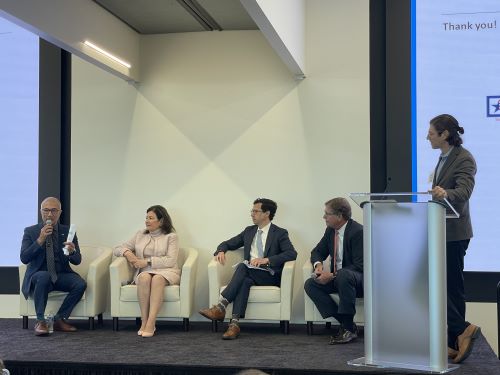DHS' Newly Proposed Public Charge Rules Could be Bad for Businesses and the Economy
 The Federal government’s newly proposed rules could make it more difficult for some people to legally immigrate to the United States and could cost the US economy $164.4 billion, according to a study by the New American Economy Research Fund. The new regulation would "potentially bar millions of working-aged, aspiring immigrants in key industries from being able to come to America and gain permanent residency, and potentially bar millions more who are working legally in these industries now from being able to stay."
The Federal government’s newly proposed rules could make it more difficult for some people to legally immigrate to the United States and could cost the US economy $164.4 billion, according to a study by the New American Economy Research Fund. The new regulation would "potentially bar millions of working-aged, aspiring immigrants in key industries from being able to come to America and gain permanent residency, and potentially bar millions more who are working legally in these industries now from being able to stay."
The report states:
By encouraging or forcing workers to leave or go underground, the public charge rule change will have a destabilizing effect for several major industries in particular, including:
- Construction, where about 5 percent of all workers (almost 540,000 people) are likely to be affected.
- Natural resource and mining industries, where more than 6 percent of all workers (more than 200,000 people) would be affected.
- Hospitality, recreation, and food services, where about 4.4 percent of all workers (more than 525,000 people) would be affected.
- Professional and business services, where nearly 3 percent of all workers (about 515,000 total) would be affected.
- Manufacturing, where more than 2.6 percent of all workers (more than 450,000 people) would be affected.
- Trade, transportation, and utilities, where more than 2 percent of all workers (more than 650,000 people) would be affected.
The purpose of the new rules is to establish a criteria that determines whether an immigrant is likely to become a public charge, in order to prevent immigrants deemed as likely to become or remain public charges from staying in or coming to the US. The new rules also seek to redefine public charge from being “primarily dependent on the government for subsidence,” to “receiving one or more public benefits.”
DHS defines “heavily negative” attributes that will likely lead to inadmissibility as:
- Currently unemployed and can't demonstrate employment history or prospects
- Uninsured and have a serious medical condition that might interfere with work or require hospitalization.
- Currently receiving public benefits including: supplemental security income (SSI), temporary assistance for needy families (TANF), food stamps (SNAP), section 8 housing or rental assistance, non-emergency Medicaid, subsidized long-term hospitalization, Medicare Part D drug subsidies, or any other federal, state, or local cash benefits;Received any of the above benefits during any 12-month period in the past three years.
In addition, DHS defines negative attributes that could lead to inadmissibility as:
- Younger than 18 or older than 61
- Having any medical condition that could interfere with work or study.
- Household income less than 125 percent of the federal poverty guidelines. (For example, for a single person, that's $15,175. For a family of four, that's $31,375.)
- US credit score of bad or fair
- No private health insurance
- No high school diploma
- Not proficient in English
- Having debt
While the DHS’ justification of these new rules, that aliens subject to the public charge inadmissibility ground should “not depend on public resources to meet their needs, but rather rely on their own capabilities and the resources of their families, their sponsors, and private organizations,” is a goal that America should strive to achieve for both its citizens and immigrants, these newly proposed rules may be narrow sighted and too strict and could lead to unintended consequences that outweigh their benefits.
For example, at a time when the US economy is at 3.7% unemployment and there are roughly a million more open jobs than unemployed Americans, workforce shortages are now stunting America’s economic growth and development. It does not make sense to kick workers out just because they are working the lowest paying jobs. Those jobs still have to get done, and many times the value that low income workers provide to the overall economy is greater than the compensation they receive.
Since the beginning of this great nation, many poor immigrants have come to America to work hard and provide a better life for their families. The American dream has allowed impoverished people who have a desire to succeed and a will to work to obtain economic mobility over time and eventually contribute more to the American society and economy than what it has given them. In many career paths, individuals start off with few skills and low pay, but overtime acquire more skills and provide greater value.
For these reasons, perhaps immigrants should be allowed to temporarily receive public benefits for a few years without it negatively affecting their ability to obtain permanent residency. However, there should certainly be a limit, and perhaps immigrants who remain dependent on public benefits as their primary source of subsistence for an extended period of time should have consequences.








